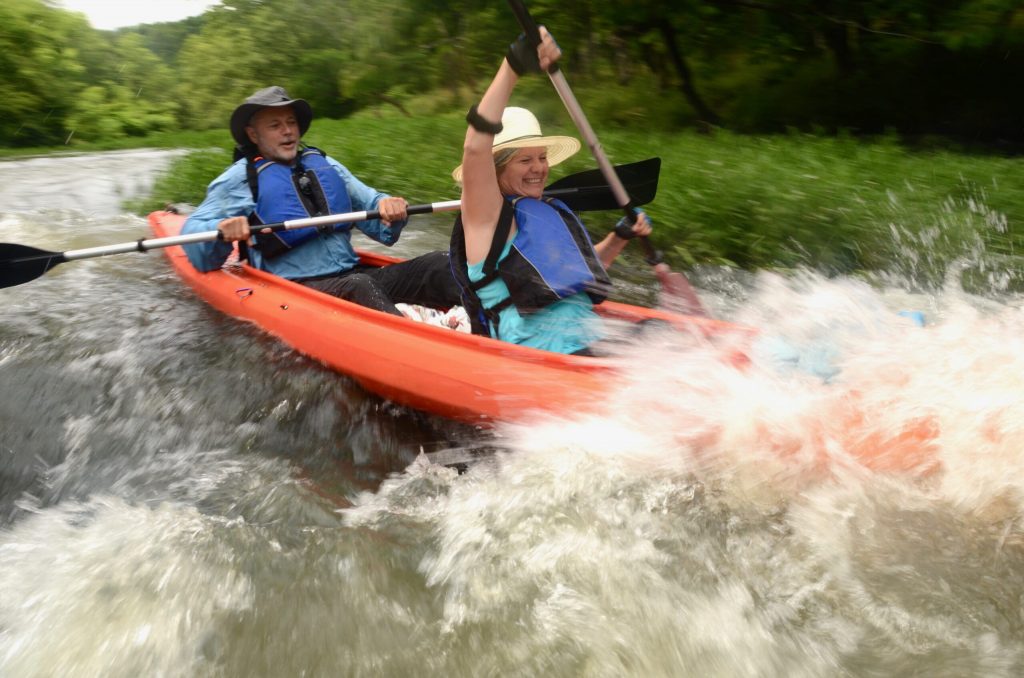House panel approves bill intended to clarify when landowners can restrict access to streams

Paddling groups have raised concerns that a new proposal could greatly curtail Georgians’ ability to paddle and explore some of the state’s premiere paddling destinations like South Chickamauga Creek in North Georgia. Photo courtesy of Georgia River Network
Lawmakers rushed to respond late in last year’s legislative session when a landowner along the Flint River successfully argued in court that he has control over who can cast a line in the popular fishing spot.
That late-session measure prompted an outcry from some landowners and representatives of the state’s prized agriculture industry, who worried the new law designed to enshrine the public’s right to fishing would make operations that withdraw water from rivers vulnerable to lawsuits.
Now, after spending last fall studying the quandary, lawmakers are back considering a potential follow-up bill meant to allay those concerns. Industry groups say they support the new measure, but is the proposed fix creating new problems?
Paddling enthusiasts showed up to a committee meeting Thursday to argue that the new bill will limit the public’s access to Georgia waterways that are deemed “non-navigable,” significantly curtailing the streams where paddlers can venture down.
“Should private property owners on all of these streams have the power to override public freedoms and all the economic benefits that flow from them?” said Suzanne Welander, who is the author of the guidebook “Canoeing and Kayaking Georgia.”
“I just ask you to protect Georgia’s freedom to float by ensuring that any stream, navigable and non-navigable, if it’s capable of floating a boat remains open and accessible to the public.”
Opponents argue that by giving navigable streams the green light for paddling, lawmakers are also implying that non-navigable waterways are off-limits. They say that could have far-reaching implications, limiting access to places like the Yellow River, the Middle Oconee River and the Upper Etowah River.
“If we declare navigable streams to be open, haven’t we by negative implication said non-navigable streams are not? And that is our big concern in the paddling community about this bill,” said Dan McIntyre, who is a paddler and attorney.
Some lawmakers were unconvinced that paddling access would be newly limited by the proposal. The bill’s sponsor, Waycross Republican Rep. James Burchett, said someone would still be able to float down a non-navigable stream. They would just need the property owner’s approval.
“There was never an expansion of the right to go into a non-navigable waterway,” Burchett said to a paddler Thursday. “That doesn’t mean you can’t go. Many people float, fish and hunt on non-navigable streams because the property owner gives permission or does not want to exclude you from doing it.”
Paddlers, though, argue that isn’t practical.
“For non-navigability, we do believe it’d be impossible for us on all the rivers that we traditionally paddle to contact every property owner and ask for permission,” said Carol Reiser-Proctor, who is the past president of the Georgia Canoeing Association, which also represents kayakers and stand-up paddleboarders.
After nearly two hours of debate Thursday, the bill made it out of the House Judiciary Committee but only after the chairman, Blairsville Republican Rep. Stan Gunter, cast a tie-breaking vote.
“This is just the first step in the process. There’s more to go,” Gunter said after the vote.
Burchett argues the thorny issue needs to be resolved to avoid conflicts that can easily escalate when firearms are involved, whether on the part of the outdoorsman or the property owner – or more likely both.
He cited a 2020 situation where a property owner along the Flint River fired a gun at a family on a canoe ride, who he considered trespassers. The man was found guilty of four counts of aggravated assault and sentenced to 10 years in prison.
“When you start conflating two different issues – navigable, non-navigable and where your property rights extend – people get very passionate about that,” Burchett said. “And that’s what we’re seeking to clarify here.”
The tension between landowners and members of the public who are trying to enjoy the great outdoors is nothing new. But the situation intensified in 2022 when anglers started noticing “no trespassing” signs popping up along the Flint River, which is home to the shoal bass. A landowner’s success in clinching a settlement with the state last spring set off alarm bells and sent lawmakers scrambling for a solution.
“Because we are a strong private property rights state and we also recognize the importance of our fishermen and hunting folks, we want to balance these interests. Now, this is a delicate balance, folks,” Burchett said.
“We want to, one, allow folks to fish, hunt and pass down our navigable waters, while at the same time maintain people’s personal property rights,” he said.
The bill now goes to the rules committee, which decides which bills move on to the House floor for a vote by the full chamber. Crossover Day, when a bill must clear at least one chamber to have a clear path to becoming law, is Feb. 29.
Rep. Stacey Evans, an Atlanta Democrat, questioned whether Georgia should meddle in the issue when litigation is pending.
“Aren’t we supposed to not work on bills that affect pending litigation?”
Burchett said that may be true but added that lawmakers already acted last year and this new proposal is meant to put the state “in a better spot” when it comes to claims from property owners who argue the state’s position amounts to an unconstitutional taking.
SUPPORT NEWS YOU TRUST.
The post House panel approves bill intended to clarify when landowners can restrict access to streams appeared first on Georgia Recorder.



